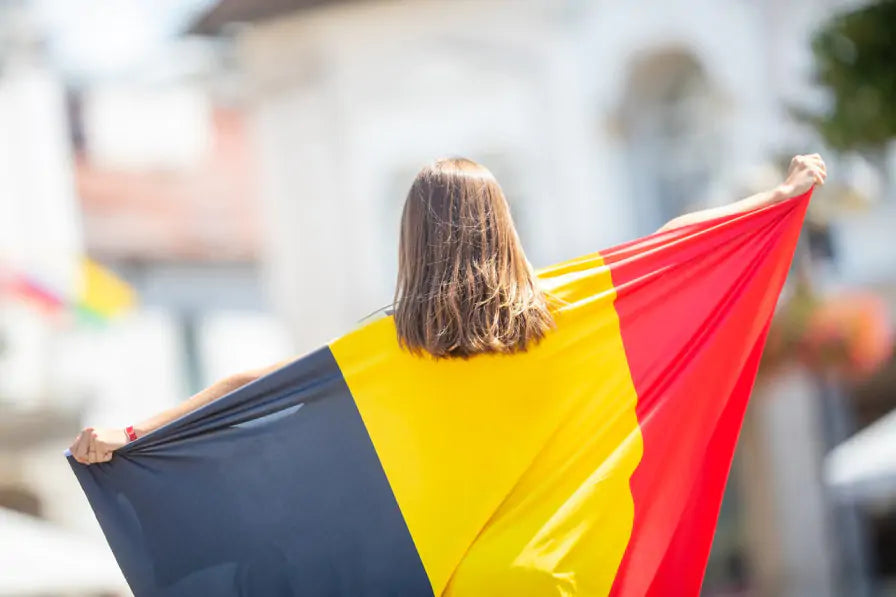Your basket is currently empty.
Shop NowRecycling Around the World: Belgium

Recycling Around the World A to Z
Belgium
Belgium boasts the highest recycling rate in Europe. Nearly three fourths of residential waste is reused, recycled, or turned into compost.
There was a waste decree in 1981, which set goals for reducing household waste, waste separation, and composting. These goals were far exceeded, then more ambitious goals were set.
The emphasis of Belgium’s waste management policies is on recycling and reducing waste, and the amount of waste produced has not risen since the year 2000, even though Belgium has experienced economic growth in that time.
History and development of waste disposal and management in Belgium
1991-1995
A plan for all vegetable, fruit and garden waste was developed. A national compost organisation was created which encouraged the reduction of organic waste and promoted composting.
Originally, organic waste was treated at one compost plant, but the quality was not great, due to the lack of separation of the materials. Separate collection of green waste and vegetable and fruit waste was then introduced, which improved the quality of the compost. All local authorities had to meet targets for waste separation and reduction of household waste. By 2010, there were 35 compost plants and 29 plants which processed agricultural and animal waste. Saving these materials from landfill meant that 480,000 fewer tonnes of CO2 emissions were produced.
 Image courtesy of WRAP UK
Image courtesy of WRAP UK
1998
Sending unsorted, recyclable, and pharmaceutical waste to landfill was prohibited, so was incineration of recyclables. An environmental tax was imposed on waste that was still suitable for landfill and incineration, which was a financial incentive for firms to avoid using these waste disposal methods.
2008
110 second-hand shops were given subsidies to encourage the reusing and recycling of products. Waste legislation imposes a mandatory duty on producers, importers, and retailers of some items to take back products that are no longer needed. This includes batteries, electronic equipment, industrial oils, and vehicles. Producers are responsible for the proper disposal of the waste.
Household waste strategies
Belgium has some strategies to manage and reduce household waste.
Pay as You Throw
Different types of waste are taxed. The more difficult the waste is to process and dispose of, the higher the tax. This encourages people to be a lot more discerning about what they throw away. Organic materials are one of the highest taxed items, and lower taxes are put on plastic bottles and drinks cartons. Paper, cardboard, and glass bottles are collected for free. Tax on bulky waste can vary depending on the amount of waste you want to dispose of.
Home composting
Money has been spent on educating residents about composting, encouraging it in schools, and introducing annual charges for the collection of garden and food waste. The home composting campaign managed to divert 100,000 tonnes of organic waste from going to landfill.
There are community compost plants in the larger towns and cities where residents can take organic materials, though by 2010, 34% of the Belgian population was composting at home.
Other waste prevention methods
The Belgian government have run various other campaigns to reduce waste, including promoting tap water instead of bottled, discouraging the use of plastic bags, and issuing door stickers for residents stating that they don’t want junk mail to be delivered to their property.
How does Belgium sort and recycle household waste?
Some rubbish is collected from individual households, but it can also be disposed of at collection points and recycling container parks.
Sorting rubbish
Glass
Empty bottles and jars without a cap or a lid can be recycled. In most regions, clear and coloured glass must be separated. Light bulbs, mirrors, and window panes must be disposed of as bulky waste though.
Paper and cardboard
Newspapers, magazines, and boxes need to be clean enough to be recycled. Kitchen roll and greaseproof paper are not recyclable as paper.
Plastic and metal
These are used to make new products like packaging or textiles. Plastic bags and aluminium foil are not to be included in this waste and must be disposed of separately.
Garden and food waste
Vegetables, fruit, grass cuttings, and leaves are all suitable to be composted. This waste is collected from households. Timber and charcoal is not suitable for composting.

Small hazardous waste
Paint and varnish, engine oil, pesticides and similar are harmful to public health and to the environment, so they need to be collected separately from other rubbish. Car batteries can be taken back to a garage, and ordinary batteries can be taken to designated collection boxes in supermarkets and petrol stations.
Building waste and rubble
There are special container parks for disposal of this type of waste
Textiles
Clothing, shoes, and linen can be collected from households or taken to a designated collection point at a container park.
Electrical and electronic appliances
Refrigerators, televisions, computers and washing machines can be disposed of at a designated container park free of charge. When you buy a new electrical appliance, the original seller is obligated under Belgian law to take back your old appliance.
